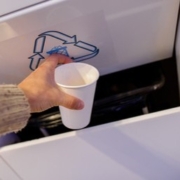North Carolina’s Cumberland County Can Now Recycle Foam
Cumberland County, North Carolina, the fifth-most populous county in the state with over 336,000 residents, received a $50,000 grant from the Foodservice Packaging Institute’s Foam Recycling Coalition (FRC). The grant enables the recycling of foam polystyrene (PS), such as cups, plates, bowls, take-out containers, egg cartons and block packaging foam.
The FRC grant assisted with funding the purchase and installation of a foam densifier, used to compact foam products into foam blocks or ingots. The foam ingots will be sold to processors and manufactured into architectural molding and picture frames.
The foam densifier was installed at the Ann Street Landfill site located in Fayetteville. Residents can take their recyclables, including foam PS, to the Ann Street location or any of the county’s 16 container sites.
“This grant expands recycling opportunities for our residents while helping Cumberland County reduce waste and recover valuable materials,” said Amanda Lee, Cumberland County general manager of Natural Resources. “It’s a practical, community-driven step toward a more sustainable future.”
The county has developed an outreach campaign to inform residents of foam recycling, including those in the communities of Fort Bragg, Fayetteville, Falcon, Eastover, Godwin, Hope Mills, Linden, Spring Lake, Stedmann and Wade. They are also working with county-operated building staff to separate foodservice trays and containers for recycling.
“Cumberland County is the sixth community in North Carolina to receive a grant from FRC,” said Natha Dempsey, president of the Foodservice Packaging Institute. “We are thrilled to support efforts that enable more than 336,000 residents in the county, and over 3 million people statewide, to have access to recycling polystyrene foam.”
The grant is made possible through contributions to FRC, which focuses exclusively on increased recycling of post-consumer foam polystyrene. Its members include Americas Styrenics; Chick-fil-A; CKF Inc.; Dart Container Corp.; Dyne-A-Pak; Genpak; INEOS Styrolution America LLC; Novolex; and Republic Plastics.
Cumberland County is the 41st grant recipient to receive FRC funding since 2015. Over 15 million additional residents in the U.S. and Canada can recycle foam polystyrene because of FRC grants. Visit www.RecycleFoam.org to learn more about foam recycling, read about previous recipients or apply for a grant.

